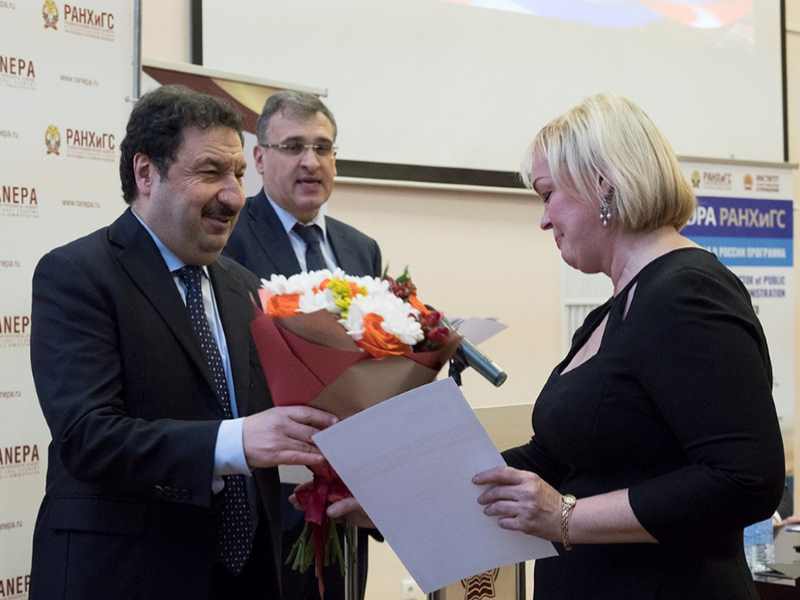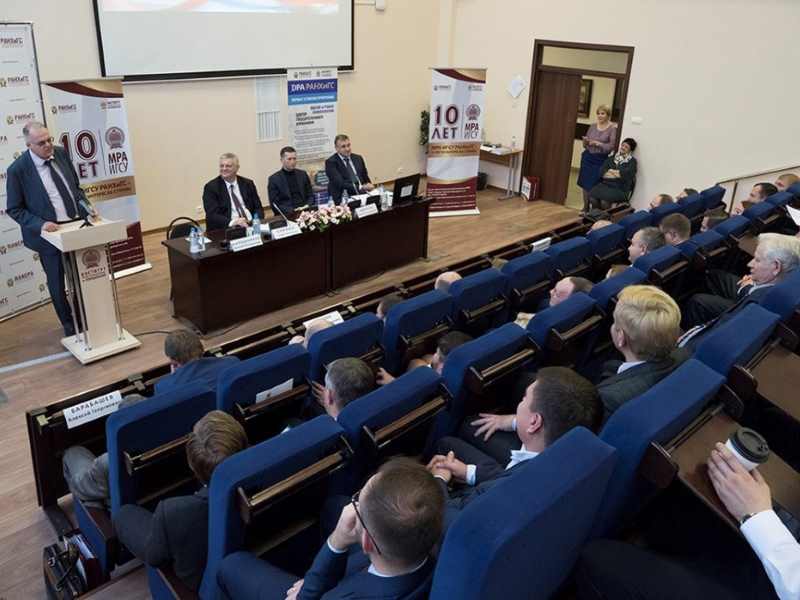RANEPA marks 10th anniversary of MPA program with launch of grander educational project
The Presidential Academy has marked the 10th anniversary of the country’s first MPA (Master of Public Administration) program. On the same day, Director of the Russian Government Department for Public Service and Personnel Andrei Soroko opened a new program, DPA (Doctor of Public Administration), at RANEPA Institute of Public Administration and Civil Service (IPACS).
The meeting was opened by RANEPA IPACS Director Igor Bartsits who noted that the ceremony brought together the participants of the first Master of Public Administration program launched in October 2009 and those who will continue to implement the MPA and the new DPA program. “This program is for accomplished professionals who seek interesting projects, intellectual and emotional development for themselves and for society. Participants will have good opportunities for self-development, for further fruitful activity and for earning a doctoral degree,” Dr. Bartsits said.
Andrei Soroko, the scientific director of the new DPA program, emphasized the relevance of the programs delivered by the Presidential Academy. Training personnel for public administration has its own specifics, and students always need new educational tracks. “I consider it one of my most important jobs to create conditions for greater openness of the civil service, because public officials are people who serve the good of the Fatherland,” he said.
RANEPA Rector Vladimir Mau greeted everyone and welcomed the anniversary of the MPA program and DPA launch. He emphasized the importance of these programs for the Academy, noting the role of those who pioneered them. The rector especially thanked Vladimir Yegorov, head of the UNESCO Department at RANEPA IPACS, Aide to the Soviet President, Rector of RACS in 2000-2010 and Minister of Culture in 1998-2000, and RANEPA Vice-Rector, Director of the Institute for Finance and Sustainable Development (IFSD) Andrei Margolin.
“It was the first attempt to truly embrace the international experience of delivering such programs and to create a Russian national product, and I think it worked out,” Mr. Yegorov said about the MPA program. As for the past eight graduations, “most of the graduates and those who teach and implement these programs at the Academy now hold high government posts,” he said. Andrei Margolin noted that the DPA program is a logical continuation of the MPA, originally developed in close partnership with Canada’s Carleton University.
Pavel Shevtsov, deputy head of the Rossotrudnichestvo federal agency for compatriots, said many foreign ministers know about the Russian Presidential Academy and its MPA program. He also underscored the President’s and Government’s attention to the development of humanitarian policy in the regions, including through education.
Vice-Rector, Director of RANEPA Institute of Business Studies (IBS), President of the Russian Association of Business Education Sergei Myasoyedov said RANEPA MPA and DPA programs occupy a very important niche emphasizing the international recognition of Russian programs by major universities and employers in leading countries. The MPA program has been accredited by AMBA, which is a major national breakthrough, Dr. Myasoyedov added.
Alexei Barabashev, head of the Department of Public and Local Service at the National Research University – Higher School of Economics, spoke about how the program was initiated and how they worked together on its content and accreditation. “It was an experiment, and we did not know how it would turn out and how something created in other countries would fit in Russia. Over the past decade, the program has shown that we have chosen the right path, that the graduates are satisfied, and now the DPA is a new level, which has become possible thanks to the accumulated material,” the speaker commented.
First vice-rector of the Russian Government’s Financial University Oleg Kuznetsov pointed out the practical function of the programs. According to RANEPA Vice-Rector Georgy Idrisov, the MPA and DPA programs should be difficult for students and should challenge them to grow. A graduate of the MPA program, Minister of Digital Development of the Kaluga Region Alexander Arkhangelsky, shared how the program helped him expand the horizon and take a fresh look at the duties he performed.
Other speakers included Director of the Moscow School of Architecture MARCH Nikita Tokarev; MPA graduate, 7th State Duma deputy Alexei Kanayev; director of the Civil Society and Social Communications research center, deputy head of the UNESCO Department at RANEPA IPACS Olga Astafyeva; Associate Professor at the Department of International Economic Organizations and European Integration of the Faculty of World Economy and World Politics at RUDN University Inna Andronova; MPA graduate, director of the Center for Health Development at Moscow City University of Management Konstantin Tsaranov; Director of RANEPA IPACS research and education center for MPA programs Yelizaveta Stepanenko; Associate Professor at the RANEPA IPACS Department of Legal Support for State and Municipal Services Tigran Zanko; and Deputy Director of RANEPA IPACS for research Galina Ivleva.
 Vladimir Mau awarded RANEPA rector’s honorary certificates to members of the MPA team, not only teachers from the Presidential Academy, but also from other universities, practitioners from state authorities, and the administration of the RANEPA IPACS research and education center for MPA programs.
Vladimir Mau awarded RANEPA rector’s honorary certificates to members of the MPA team, not only teachers from the Presidential Academy, but also from other universities, practitioners from state authorities, and the administration of the RANEPA IPACS research and education center for MPA programs.
Master of Public Administration is the first MPA program in Russia that successfully trains personnel for state and municipal services since 2009. Over the past decade, more than 600 master’s students have been trained at RANEPA IPACS, and considerable experience has been accumulated in the professional retraining of state and municipal employees. The academic director of the MPA program is Alexei Shaposhnikov, speaker of the Moscow City Duma.
Doctor of Public Administration is a training program for senior managerial personnel. The first group of students enrolled for the program includes state and municipal employees, representatives of academia and business, who have high research and development potential as well as extensive practical experience. About a third of the group are MPA program graduates. At the end of the program, participants will develop socially significant projects and conduct studies in the field of state and municipal administration.



